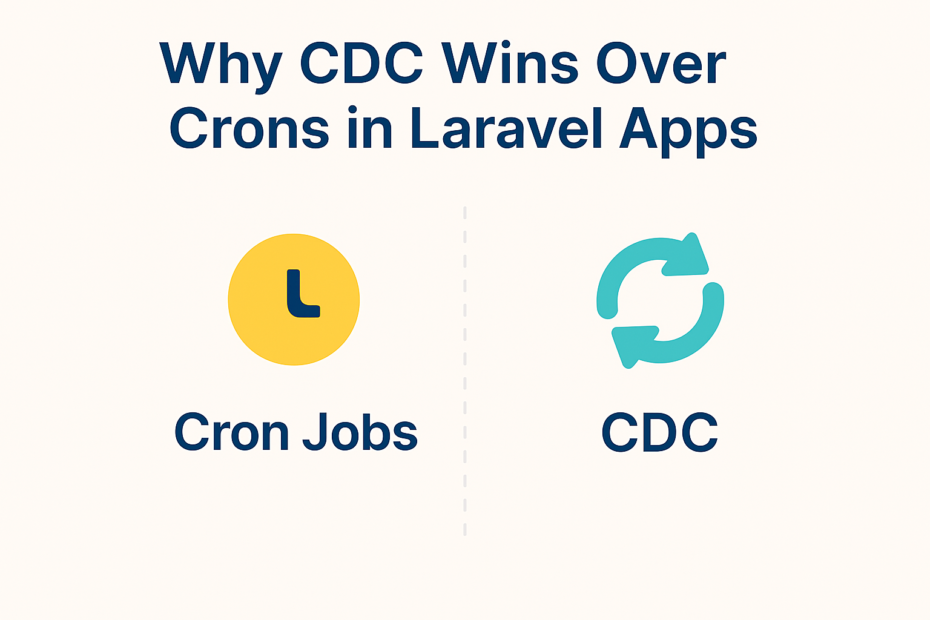In the world of Laravel applications, keeping data fresh and responsive is key—whether you’re syncing records, auditing changes, or triggering downstream events. Traditionally, developers have leaned on cron jobs for routine tasks. But there’s a smarter, more reactive way: Change Data Capture (CDC) using Laravel’s built-in Eloquent events.
Let’s explore why CDC is a game-changer, and how it gives Laravel apps a clear edge over the old-school cron routine.
🧠 The Problem with Crons
Cron jobs are like your overly punctual friend who knocks on your door every five minutes just to check if anything’s happened. They:
- Run at fixed intervals, regardless of whether data has changed
- Create unnecessary database load
- Introduce delays in processing (what if the change happened just after the last cron run?)
- Often require complex state tracking to avoid duplication
Here’s what a typical Laravel cron setup might look like:
* * * * * php /path/to/artisan schedule:run >> /dev/null 2>&1Inside your Kernel.php:
$schedule->command('sync:orders')->everyFiveMinutes();It works—but it’s far from elegant or efficient.
⚡ Enter Change Data Capture (CDC)
CDC flips the model: instead of polling for changes, it listens to them in real time.
Thanks to Laravel’s Eloquent events, this becomes seamless:
class Order extends Model
{
protected static function booted()
{
static::updated(function ($order) {
// Fire webhook, sync to external API, or log audit data
});
}
}🔍 CDC vs Cron Jobs: A Quick Comparison
| Feature | Change Data Capture (CDC) | Cron-Based Polling |
|---|---|---|
| Trigger Mechanism | Event-driven (reacts to actual changes) | Time-based (runs even if nothing changed) |
| Efficiency | Processes only changed data | May redundantly process unchanged data |
| Latency | Instantaneous | Delayed by poll interval |
| System Load | Minimal—fires only when necessary | Higher—frequent queries regardless of state |
| Ideal Use Cases | Auditing, real-time sync, event-driven workflows | Batch jobs, report generation, cleanup tasks |
🎯 When to Use CDC in Laravel
CDC is your go-to when:
- You need real-time event reactions (like syncing order status with external APIs)
- You want to track data changes for auditing
- You’re building event-driven architectures or microservices
- You’re tired of setting up multiple cron expressions with half-empty jobs
🧭 Using Laravel Observers for Cleaner CDC
While Eloquent model events are great, observers offer a cleaner, more modular way to implement CDC—especially when you’re tracking changes across multiple models or want to keep your models lean.
🔧 Step 1: Generate an Observer
php artisan make:observer OrderObserver --model=OrderThis creates a dedicated OrderObserver class where you can define lifecycle hooks such as created, updated, and deleted.
🧑💻 Step 2: Add CDC Logic in Observer
class OrderObserver
{
public function updated(Order $order)
{
$original = $order->getOriginal();
$changes = $order->getChanges();
Log::info("Order #{$order->id} updated", [
'before' => $original,
'after' => $changes,
]);
// Trigger webhook, update search index, sync external system, etc.
}
}⚙️ Step 3: Register Your Observer
In your AppServiceProvider:
public function boot()
{
Order::observe(OrderObserver::class);
}Now every time an order is updated, your observer kicks in—making your data layer feel reactive without bloating your model logic.
✨ Why Observers Elevate CDC
- ✅ Separation of concerns: Business logic lives outside the model
- ♻️ Reusable: Easily apply the same observer pattern across different models
- 🧹 Cleaner codebase: Keeps model classes focused on data structure, not behavior
- 📈 Scalable: Better suited for larger applications and audit-heavy requirements
Final Word
By embracing Eloquent observers, you turn your Laravel models into event emitters—and your app into a clean, reactive system. Together with Laravel’s elegant syntax, CDC becomes not just a backend trick, but a scalable pattern that outpaces cron jobs in performance, clarity, and real-time reliability. 🔧📝🔥
Fuel my creative spark with a virtual coffee! Your support keeps the ideas percolating—grab me a cup at Buy Me a Coffee and let’s keep the magic brewing!
